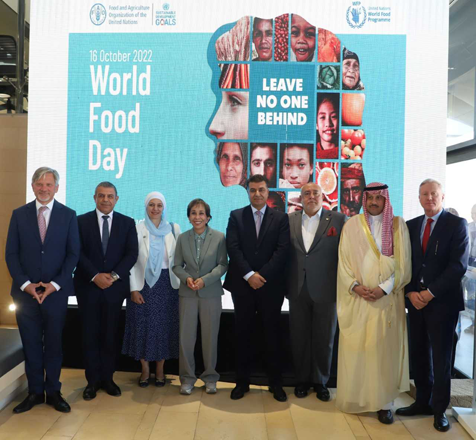You are here
‘Dire need’ for innovative solutions to tackle world hunger — experts
By Mohammad Ghazal - Nov 09,2017 - Last updated at Nov 09,2017

A panel of experts during a plenary session titled 'Science and Food Security: How to Feed the World Sustainably and Equitably' at the King Hussein Bin Talal Convention Centre at the Dead Sea on Wednesday (Photo by Amjad Ghsoun)
DEAD SEA — With some 850 million people suffering from hunger or food insecurity across the globe and over 2 billion individuals suffering from malnutrition, scientists and experts on Wednesday said there is a "dire need" for a holistic and multi-disciplinary strategy to address these growing challenges.
They said the deployment of science and the latest technologies through innovative solutions was "vital" for the development of a holistic strategy, which would help address these challenges.
The remarks were made by a panel of experts during a plenary session titled "Science and Food Security: How to Feed the World Sustainably and Equitably", which was held on Wednesday, the second day of the World Science Forum 2017.
The global event attracted more than 3,000 scientists, policymakers, nobel laureates, academics and investors under the theme “Science for Peace”.
HRH Prince Hassan, President of the Royal Scientific Society’s Board of Trustees, stressed the importance of science and technology in food security and their role in reducing the waste of food and in developing the agricultural production and improving the use of soil.
“The problem is not the lack of food, as there are 2 billion people across the globe suffering from obesity while the number of those suffering from hunger or malnutrition are also high, which is a paradox,” Vladimir Sucha, director general of the European Commission-Joint Research Centre, said during the session.
Stressing the need to address food waste to ensure food security, he noted that, although there are sufficient reserves of food, the rate of food waste stands at 25 to 30 per cent, which he labelled as “huge”.
In Europe, the average food waste per capita is 128 kilogrammes per year.
“When seeking to ensure food security, there is a need for a holistic approach that takes into account other vital sectors such as water, energy, environment and climate change…all stakeholders in these areas need to come together for better solutions,” Sucha stated.
According to Jacqueline McGlade, professor of resilience and prosperity at the University College London, 46 per cent of deaths among children under the age of 5 are due to under-nutrition.
A total of 20 million children suffer from acute malnutrition annually, while 160 million children suffer from stunting, McGlade said.
“Under-nutrition affects childhood development and it has devastating impact on the children’s cognitive behaviour…which eventually results in violent reactions,” she said.
“Experts from all fields need to get together to share their knowledge and come up with solutions that should involve everyone’s contribution for the global good,” the professor added.
Ertharin Cousin, the Frank E. and Arthur W. Payne distinguished lecturer at Stanford University’s Freeman Spogli Institute for International Studies, referred to the relationship between food security, conflicts and peace.
Conflicts keep people in need and food insecurity increases the immigration phenomenon, she said, calling for increased and adequate financial aid and humanitarian assistance to address the issue.
“Ongoing conflicts limit humanitarian access…Hunger and malnutrition will result in more conflicts with worse consequences,” said Cousin, who is also a contemporaneous Visiting Fellow at FSI’s Centre on Food Security and the Environment (FSE) that was chosen as the Payne Distinguished Lecturer.
To address these challenges, Sarah Agbor, African Union commissioner for Human Resources, Science and Technology in Cameroon, called for more focus on science and technology to come up with innovative solutions, saying that the majority in Africa still suffers from hunger (see story on page 2).
There is a need for more efforts to involve the youth in such solutions, as they represent 65 per cent of the population of Africa, she said, adding that Africa has a “tremendous potential” to feed the world.
“A hungry man is an angry man…we need a multi-dimensional approach to address food insecurity; and science and technology are key in this journey,” Agbor said.
Changing consumer’s behaviour is also a key factor in addressing food insecurity worldwide, said Tassos Haniotis, director for “Strategy, Simplification and Policy Analysis” in the DG for Agriculture and Rural development of the European Commission.
“Worldwide food consumption is increasing at rates higher than population growth…there is a need to change human behaviours and to follow the best practices in rationing the use of water and energy,” he said.
“There is also a knowledge gap. A scientific gap exists in this regard and we need to keep exchanging knowledge for the benefit of all,” Haniotis concluded.
Related Articles
AMMAN — The regional directors of the Food and Agriculture Organization of the United Nations (FAO) in the Near East and North Africa (NENA)
AMMAN — The prevalence of undernourishment (PoU) in Jordan rose sharply following the start of the Syrian crisis, a recent report by the Foo
AMMAN — The Food and Agriculture Organisation of the United Nations (FAO) and World Food Programme (WFP), the leading UN agencies working to



















